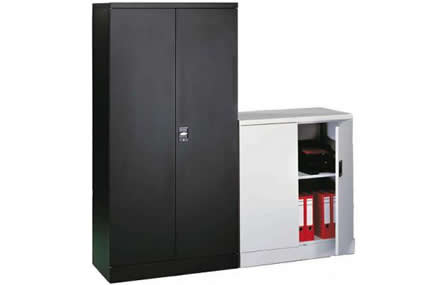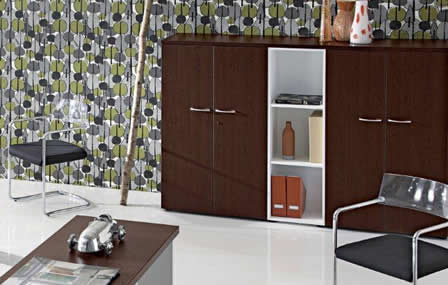Are you struggling to find enough storage space in your office? It can be a frustrating and time-consuming task, trying to figure out just how much storage your business needs.
In this article, we will explore various factors that play into determining how much storage an office requires. From assessing specific document and equipment needs to considering growth potential, we'll guide you through finding the ideal amount of storage for your business.
So if you're tired of cluttered offices and overflowing file cabinets, keep reading! We have all the tips and tricks you need to optimise your office's storage space efficiently.

Assessing Your Business's Needs
So, how much storage does your office need? Assessing your business's needs is crucial in determining the right amount of storage space for your office.
Determining the type of documents and equipment will help gauge the appropriate amount of storage required for your office. By understanding what kind of materials you need to store, you can better estimate how much space is necessary.
Here are some factors to consider when determining the type of documents and equipment:
-
Paper documents: If your business relies heavily on physical paperwork, such as contracts, invoices, or customer records, you will likely need ample space for filing cabinets or shelves.
-
Digital files: If most of your documents are stored electronically, you may not require as much physical storage space. However, it's essential to have a reliable and secure digital storage system in place.
-
Equipment: Consider the size and quantity of any office equipment that needs storage. This could include printers, scanners, copiers, or specialised machinery specific to your industry.
-
Supplies: Don't forget about storing necessary office supplies like pens, paperclips, envelopes, and other stationery items. These smaller items can quickly accumulate and require designated storage spaces.

Considering Growth Potential
To ensure your office is prepared for future expansion, it's important to consider the potential for growth. As your business grows, so will your storage needs. You may start with a small amount of documents and equipment now, but you'll need additional storage space as you hire more employees and take on more clients.
By considering the growth potential of your office, you can plan ahead and avoid running out of storage space in the future.
One way to determine your office's growth potential is by looking at historical data. Analyse past trends and projections to get an idea of how your business is likely to grow over time.
Consider factors such as revenue growth, customer acquisition rates, and employee headcount. This will give you a better understanding of how much storage space you'll need in the coming years.
Perhaps you have a fixed style in your office: polished wood, retro chic, or a black-and-white theme, for example. In this case, you may have specific colour or style specifications. It should be possible to find office furniture to fit your remit. Alternatively, you may just be looking for storage that does the job, fits in the space you have and doesn’t cost the earth. If so, the office furniture world is your oyster!
In addition to historical data, it's also important to think about expansion plans. Are you planning on opening new locations or introducing new products or services? These factors can greatly impact your storage needs.
By considering both past trends and future plans, you can make informed decisions about how much storage space your office will require to accommodate its growth potential.
Optimising Storage Space
When it comes to maximising your office's storage space, there are a few key strategies you can employ.
Firstly, consider utilising vertical space by installing tall shelves or cabinets. This will allow you to use the height of your office and free up valuable floor space.
Secondly, invest in storage solutions that are flexible and adaptable. Modular shelving units or filing systems can be easily rearranged as your storage needs change. This way, you can optimise the space according to your current requirements without wasting any precious room.
Next, think about implementing smart organisation techniques. Labelling shelves and using colour-coded bins or folders will make it easier for you and your employees to find what they need and help maximise storage efficiency.
Additionally, consider digitising documents whenever possible. By scanning important papers and storing them electronically, you can reduce the need for physical file cabinets or boxes, freeing up even more storage space.
To further optimise storage in your office, take advantage of underutilised areas such as walls and corners. Hang hooks or pegboards on walls to keep frequently used items within easy reach while saving desk or shelf space. In corners, install corner shelves or utilise corner desks that provide additional storage options without taking up much room.
By employing these strategies - utilising vertical space, investing in adaptable solutions, implementing smart organisation techniques, and utilising underutilised areas - you can effectively optimise the storage space in your office while keeping everything easily accessible and organised.
Finding the Ideal Amount of Storage
To create an efficient and organised office space, you'll want to strike the perfect balance regarding how many storage solutions you incorporate.
Too little storage can lead to cluttered desks and overflowing cabinets, making it difficult to find important documents or supplies when needed. On the other hand, having too much storage can also be counterproductive as it may encourage hoarding and unnecessary accumulation of rarely used items.
Assess your current needs to find the ideal amount of storage for your office. Consider the type of work being done and the materials required daily. Consider the number of employees using the space and their individual storage requirements. This will help you determine whether you need more filing cabinets for documents, shelves for books and binders, or drawers for small office supplies.
Finding the right balance between too little and too much storage allows you to optimise your office space while keeping it organised and functional. Regularly evaluate your needs as they change over time to ensure that your office remains efficient without becoming overwhelmed with unnecessary clutter.
So, How Much Storage Does Your Office Need?
In conclusion, determining the amount of storage your office needs is crucial for efficiently running your business. You can optimise your storage space by assessing your business's specific needs and considering factors such as the type of documents and equipment you have and potential growth.
By conducting a thorough evaluation, you can avoid wasting valuable resources on excessive storage or facing the inconvenience of insufficient storage capacity. This will help streamline your operations and contribute to cost savings in the long run.
For help & advice on office design and storage installation, contact Gazelle Office Furniture today. Our experienced designers will advise you on what type of storage system will work best for your space and help you to design organised storage solutions for your office.
